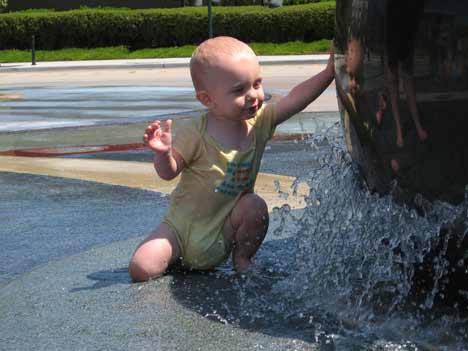A heat wave has been predicted for the next three days, and Regional Animal Services, the Office of Emergency Management, and Public Health – Seattle & King County are reminding residents that by taking simple precautions, they can keep family and pets cool and safe.
Anyone can be overcome by extreme heat, but some people are at higher risk than others. They include the elderly, the very young, and people with mental illness and chronic diseases.
Public Health – Seattle & King County is urging people to take precautions and monitor themselves and others for signs and symptoms of heat-related illness and call for medical aid as necessary. Signs of heat-related illness may vary but can include: heavy sweating, paleness, muscle cramps, tiredness, weakness, dizziness, headache, nausea or vomiting, and fainting.
Heat exhaustion can lead to heat stroke, which can cause death or permanent disability unless treated immediately. Symptoms of heat stroke include an extremely high body temperature (above 103°F); red, hot, and dry skin; rapid, strong pulse; nausea, confusion and unconsciousness.
Hot weather care for pets
Family pets do not expel heat the same way that humans do, and are vulnerable to overheating very quickly, especially when the temperature is above 70 degrees. Leaving animals in a hot car can be grounds for animal cruelty charges. Animals left in a hot car, even for a short time, can suffer from heatstroke or death. Leave pets at home instead of taking them with you on errands in warm weather.
If you see a pet in a hot car, first contact the security guards at the location you are visiting. Security guards can often use security camera footage to find the owner of the car to unlock it quickly, and they can contact Animal Care and Control for additional assistance. If no security is available, call 206-296-PETS.
Pet paws can burn when walking on hot pavement and the skin on a dog’s nose can sunburn. Be sure animals have access to shade and lots of fresh, cool water when playing outdoors. Do not over-exert pets during the warmest hours of the day, and avoid long walks or extended exercise outdoors.
If a dog or cat becomes overheated, apply cool water or cold towels to their head, neck, and chest. Then immediately take the animal to a veterinarian. For additional precautions, please consult your pet’s veterinarian.
Be sure that you and your family members drink plenty of fluids and stay in air-conditioned buildings such as public libraries and community centers, malls and movie theaters. Check on relatives and neighbors, particularly those with health issues. Never leave children or pets unattended in a vehicle, even with the windows rolled down.
If cities within King County designate cooling centers over the next few days, it will be posted on the Office of Emergency Management Web site at www.kingcounty.gov/prepare. King County cooling center updates will also be made to the Regional Public Information Network (RPIN), www.rpin.org.
More hot weather safety tips are available at www.kingcounty.gov/health/BeatTheHeat
Talk to us
Please share your story tips by emailing editor@kentreporter.com.
To share your opinion for publication, submit a letter through our website https://www.kentreporter.com/submit-letter/. Include your name, address and daytime phone number. (We’ll only publish your name and hometown.) Please keep letters to 300 words or less.

